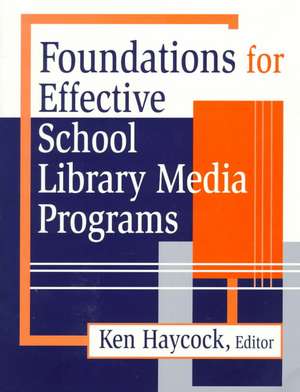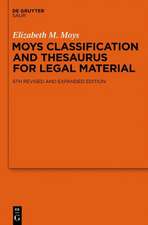Foundations for Effective School Library Media Programs
Autor Ken Haycocken Limba Engleză Paperback – 14 apr 1999 – vârsta până la 17 ani
Preț: 327.84 lei
Preț vechi: 395.17 lei
-17% Nou
Puncte Express: 492
Preț estimativ în valută:
62.73€ • 65.66$ • 52.21£
62.73€ • 65.66$ • 52.21£
Carte tipărită la comandă
Livrare economică 31 martie-14 aprilie
Preluare comenzi: 021 569.72.76
Specificații
ISBN-13: 9781563083686
ISBN-10: 156308368X
Pagini: 331
Dimensiuni: 216 x 279 x 18 mm
Greutate: 0.8 kg
Ediția:New.
Editura: Bloomsbury Publishing
Colecția Libraries Unlimited
Locul publicării:New York, United States
ISBN-10: 156308368X
Pagini: 331
Dimensiuni: 216 x 279 x 18 mm
Greutate: 0.8 kg
Ediția:New.
Editura: Bloomsbury Publishing
Colecția Libraries Unlimited
Locul publicării:New York, United States
Notă biografică
Ken Haycock, EdD, is research professor of management and organization at the University of Southern California, where he directs the Center for Library Leadership and Management.
Cuprins
ContributorsIntroductionPart One: The FoundationsChapter 1: Strengthening the Foundations for Teacher-LibrarianshipChapter 2: Research in Teacher-Librarianship and the Institutionalization of ChangePart Two: The School ContextChapter 3: Leadership for School ImprovementChapter 4: The School Library Program and the Culture of the SchoolChapter 5: Libraries, Learning and the Whole SchoolPart Three: Role ClarificationChapter 6: The School Librarian as a Professional TeacherChapter 7: Navigating the '90's - The Teacher-Librarian as Change AgentChapter 8: Developing Information Literacy Through the Information Intermediary ProcessChapter 9: Teacher-Librarians: Mirror Images and the SparkChapter 10: Students' Information Literacy Needs: Competencies for Teacher-Librarians in the Twenty-First CenturyPart Four: Informaton LiteracyChapter 11: Information Literacy in an Information SocietyChapter 12: Media Literacy: The New Basic-Will the Real Curriculum Please Stand Up?Chapter 13: Student Access to the Internet: Librarians and Teachers Working Together to Teach Higher Level Survival SkillsChapter 14: Misinformation on the Internet: Applying Evaluation Skills to Online InformationChapter 15: Information Skills in the Curriculum: Developing a School-Based CurriculumChapter 16: Developing a School-Based Research Strategy K-7Chapter 17: Computer Literacy and Information Literacy: A Natural CombinationChapter 18: All That Glitters May Not Be GoldPart Five: Collaborative Planning and TeachingChapter 19: Curriculum Encounters of the Third Kind: Teachers and Teacher-Librarians Exploring Curriculum PotentialChapter 20: The School Librarian and the Classroom Teacher: Partners in Curriculum PlanningChapter 21: Changing Teaching Practice to Meet Current Expectations: Implications for Teacher-LibrariansChapter 22: Expanding the Collaborative Planning ModelChapter 23: Collaborative Planning: A Model That WorksPart Six: Program Development: A Systemic ApproachChapter 24: Developing the School Resource Center Program: A Developmental ApproachChapter 25: From Library Program to Learning Resources Program: Cooperative Program Planning and TeachingChapter 26: Prerequisites to Flexible SchedulingChapter 27: Secondary School Assignments: Cooperatively Planned and TaughtChapter 28: A Stations Approach to Learning: The Conversation of a Secondary School SkepticChapter 29: Connecting Writing and Research Through the I-Search Paper: A Teaching Partnership Between the Library Program and ClassroomChapter 30: Designing Thematic Literature UnitsChapter 31: What Do You Believe About How Culturally Diverse Students Learn?Chapter 32: Principals and Teacher-Librarians: A Study and a Plan for PartnershipChapter 33: Communication Skills and Strategies for Teacher-LibrariansPart Seven: AccountabilityChapter 34: School Libraries - Definitely Worth Their KeepChapter 35: Using Evaluation to Bring School Library Resrouce Center Programs into Closer Alliance with Information PowerChapter 36: Evaluation: The Key to GrowthChapter 37: Evaluation of the Teacher-Librarian: A Discussion GuideChapter 38: Theory - Where is My Reality?




